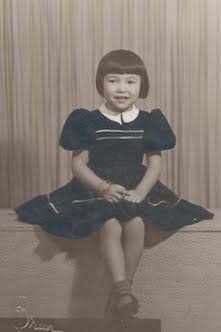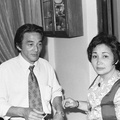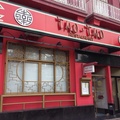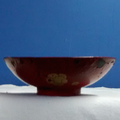I was the youngest of a large family. When I was born, my parents were already old enough to be grandparents. So I grew up with the advantages of having two calm and wise people on hand who had learned from their life experiences. My brothers and sisters were somewhat older than me, so they acted like my parents. I was surrounded by numerous adults who took care of me and guided me through life with unending patience. Moreover, in the 1950s people looked older than we do at the same age. That was the modest and simple style of that time, as people dressed very plainly. Women over forty years old already felt their existence fade away, with few social activities. That’s how my sisters were, but I didn’t want to be like them. I dreamed of being audacious like a movie star and I always had something to say, even now that I am old.
My irrepressible interest in reading emerged early and was always encouraged by my parents, who were passionate lovers of literature. On my first day of classes, as my father was taking me to school, he said with great emotion: “What good luck, you’re going to learn to read! You’re going to get to know all of the books in the world…” Reading was an everyday activity in my house. My parents read, I read, while my brothers and sisters who worked hard read on occasion.
Encouraged by reading, my imagination was so lavish that at eleven years of age, I wrote a short play with characters representing all the kids in the neighborhood. I don’t know whether it had any literary value; the only thing I know is that we had a lot of fun. I doubt that today’s children, who participate in so many scheduled activities, are able to enjoy such intellectual fulfillment.
But I have to recognize that my home was very singular in terms of customs and creeds, since my father was a Japanese Buddhist and my mother, the daughter of immigrants from Genoa, was Catholic. With her Christian perspective, she decided that “for the good of our souls” that we would be baptized and subjected to all the Catholic rites. Papa never objected, as he had great respect for the wishes of the wife he loved. In return, my mother found opportunities to mention her special consideration for Buddha, while my father always described Jesus respectfully as “a very good person.”
My father used to tell us that Buddha had gotten rid of all his material possessions in order to sanctify his spirit. My mother, meanwhile, said that Jesus, dressed in a simple tunic, had wandered throughout the world preaching goodness. So on both sides I had good examples to follow. But my parents didn’t just preach, they always acted in a consequential way.
My father used to give away his things to whoever showed interest in them. Every time we moved, we arrived at our new house without anything that could be given away. Because of that attitude, we often had to buy things over again.
My mother never wanted material objects because, as she said, she didn’t need them at all. She never went shopping. She was happy to wear the same clothes almost all the time, and the only gifts she truly enjoyed receiving were books. We were peaceful and generous, thanks to their teachings.
When my father died, my mother decided to bury him according to western Christian tradition. But she still followed the Buddhist custom of a 49-day funeral rite. For the Buddhists in my family, during the seven weeks after someone dies, their spirit wanders through their home until finally departing for their home in heaven. So she put a photograph of father on the night table in his room, and during that time we brought him breakfast, lunch, tea, and dinner. It was quite emotional for me, still a girl, to see how mother chose the food, making sure it included the things my father liked. She always included a cupful of freshly cooked rice, delicious legumes, and fish. I really felt like he was still there, content to see how his family demonstrated their respect for him.
I remember that one day a friend came home from school with me as we were going to do our homework together. It was tea time, and as always my mother asked me to bring a cup of tea and some cookies to my father’s room. I asked my friend to come with me. She followed me, surprised, but she didn’t want to enter the room because she felt somewhat afraid. However, during those days there was nothing more in the world that gave me more happiness. My father’s jacket was still hanging on the back of a chair; the aroma of tobacco brought his memory back to me, with an overwhelming need to rescue him from the shadows.
While my friend watched from the door, I left the tray on the table and then rejoined her. A little while later, after we had finished our homework, I went to my father’s room to get the tray. As I was walking to the kitchen, I took a cookie from the plate and ate it. She looked at me terrified, not understanding that it was only a symbolic act, that there was nothing wrong with eating what my father’s spirit didn’t want, for obvious reasons. My friend never visited us again, as the experience must have been too traumatic for her. Later I found out that she had told others about this anecdote at school, telling them that my family was “weird.”
I won’t deny that our customs were very unique, but that’s how we learned to be tolerant of others, to treat them with absolute respect in terms of their differences, their habits, and their customs.
Buddha and Jesus have been with me throughout my life, and they still fill me with emotion…They are wonderful beings who have guided me with wisdom and benevolence and from whom, even though I don’t belong to any religion, I ask for protection from the disasters we are causing on this marvelous planet…
I’m sure that had Buddha and Jesus met, through an alteration of time and space, they would have been great friends and fellow travelers. Even speaking different languages, they were united by the same powerful passion.
© 2016 Marta Marenco






